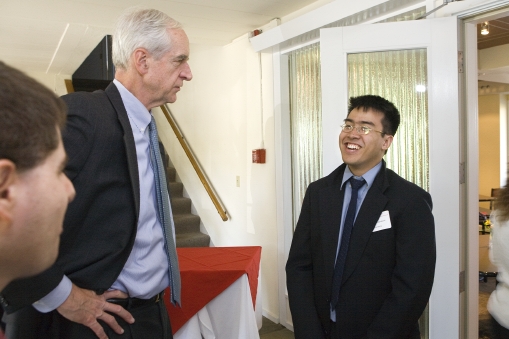ENDNOTE
The value of undergraduate research

Hunter Rawlings chats with Varat Intaraprasonk 08 at the Rawlings Presidential Research Scholars graduation ceremony, held at the Moakley House during Commencement Weekend 2008.
Two decades ago, broad-based, formal programs for undergraduate research were almost unknown at American colleges and universities, and rare was the freshman or sophomore who pursued scholarship or research under the supervision of a faculty mentor. Today, undergraduate research programs are commonplace, and large research universities and small colleges alike trumpet the research opportunities available on their campuses. Why this dramatic change?
There are many reasons, but two of the most important resulted from observations by faculty members: first, that students spent much of their undergraduate careers in large classes, where they had little opportunity for independent work or for meaningful dialogue with the faculty; and that, while the faculty were themselves heavily engaged in scholarship and research, their undergraduate students knew and appreciated very little about what their teachers were doing in the library and the laboratory. To most students, the intellectual life of the faculty outside the classroom was a total mystery. (Today it remains a partial mystery, caused by some professors' allegiance to pre-digital media; at least that's true in my case.)
In the 21st century, enterprising students often begin research work in their first semester at college and continue it throughout their undergraduate careers. And professors increasingly devote lots of time and energy to advising undergraduates on research projects running the gamut of academic disciplines. It is perhaps not surprising that undergraduate research tends to center in the sciences and engineering, where the collegial environment of the laboratory is so conducive to teamwork and natural mentoring. The first college at Cornell to take full advantage of the Cornell Presidential Research Scholars program when it was introduced in 1997 was the College of Engineering. Faculty members in engineering immediately began to sponsor large numbers of freshmen in CPRS and to offer them four years of individual mentorship and opportunities in the lab. Many engineering faculty found undergraduate students eager to participate in the kind of hands-on problem solving that is characteristic of research in the field of engineering. It was not long before the College of Agriculture and Life Sciences, with its similar approach to collaborative research, followed suit.
The departments that took the longest to take advantage of opportunities for undergraduate research were, unsurprisingly, those in the humanities and the arts. These disciplines are marked by a tradition of independent, single-author scholarship and performance, and are characterized by solitary work in the library or studio. In addition, the kind of "apprenticeship" available in the science lab is lacking in the humanities, where scholarly teamwork is rare. Furthermore, most undergraduates, even seniors, are not ready to pursue serious scholarship in the humanities or high-level performance in the arts, even under faculty guidance. They simply do not have the experience with theoretical modes of study or with close textual or visual analysis required to conduct this kind of scholarly inquiry.
Fortunately, some Cornell undergraduates are exceptions to these general rules, and some faculty members in the arts and humanities have started to find them. One distinguished professor of musicology at Cornell, initially skeptical of the idea that undergraduates, particularly freshmen, could carry out serious work in his discipline, became a convert when he found a Cornell freshman who could do astonishing scholarship in the history of music. In fact, he told me, this first-year student was better prepared and more capable than most graduate students he had mentored over a long career. In my own Department of Classics, I have had three undergraduates in the past three years write papers of a quality and level comparable to those achieved by only the best graduate students in the department.
There is something immensely exciting about a young undergraduate student doing high-level research in close partnership with a professor. This form of collaboration is inspiring to both parties: to the student because she is making discoveries at the forefront of a discipline, presenting papers at scholarly conferences and publishing her ideas while still taking introductory and mid-level courses in a wide variety of departments; to the professor because she gains another fine collaborator, and because she has the intellectual and moral satisfaction of helping a young student enter the field to which she has devoted her career. Here's to the value of undergraduate scholarship at a great research university!
Hunter R. Rawlings III, president emeritus and professor of classics, was Cornell's 10th president (1995-2003) and served again as interim president in 2005-06. In 2006, the Cornell Presidential Research Scholars program was renamed the Hunter R. Rawlings III Cornell Presidential Research Scholars program.